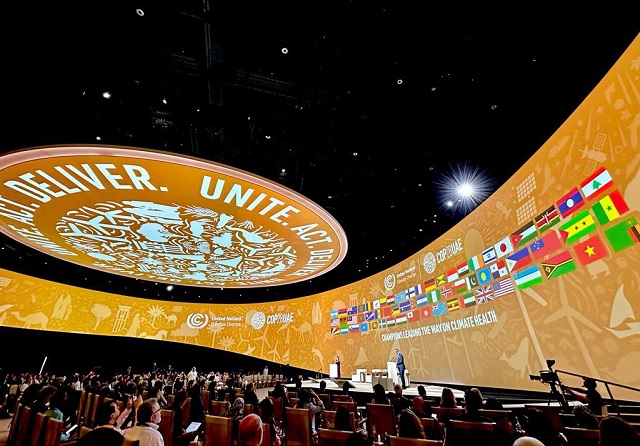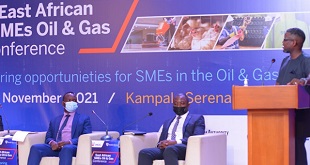
International conferences generate meaningful results only if everyone is free to criticise and peacefully demonstrate
COMMENT | MARTA SCHAAF AND KRISTINE BECKERLE | To avert catastrophic climate change, an active and empowered civil society is necessary. The ongoing United Nations Climate Change Conference (COP28) in Dubai is almost certain to provide further proof that we will fail if we rely on large, powerful institutions such as governments and multinational corporations.
Fossil-fuel companies have known about their contributions to climate change since the 1970s, yet they continue to drill and expand their operations. While governments have paid lip service to the problem by adopting the UN Framework Convention on Climate Change and the Paris climate agreement, the latest Production Gap Report shows how little these commitments mean in practice. Between now and 2030, output in the top 20 fossil-fuel-producing countries will be more than double the amount consistent with limiting global warming to 1.5° Celsius.
Self-regulation by governments and fossil-fuel companies is woefully insufficient, not least because governments and fossil-fuel companies are often one and the same. For too long, both have sought to appease public concerns with greenwashing campaigns and the promise of future silver-bullet technologies such as carbon capture and storage. And when some segment of the public is not pacified by such ploys, many of these same governments and companies have been all too willing to resort to quashing freedom of expression, association, and peaceful assembly.
Only through collective action, advocacy, and civil-society participation in policymaking will governments be forced to do what it takes to phase out fossil fuels, support the transition to renewable energy, and protect human rights in a world of increasingly extreme weather and drought. But civil society cannot thrive without civic space public fora where citizens can jointly criticise and pressure the most powerful, without fear or suppression. And at COP28, outside the protected confines of the UN’s “blue zone,” there will be virtually no civic space at all.
Dubai is one of the most expensive cities in the world, which means that lodging, food, and other expenses will be prohibitively costly for most people, especially the disadvantaged and marginalised who are most affected by the climate crisis. Moreover, it is illegal in the United Arab Emirates even to criticise the government, or to say anything deemed to “harm the public interest,” and foreigners are sometimes detained for comments made while in the country. Minor signs of dissent during the 2011 Arab Spring were quickly and forcibly repressed. To this day, scores of human-rights activists and dissidents remain arbitrarily detained, including 60 members of the “UAE-94,” who were tried en masse in 2013. Four years later, the UAE imprisoned Ahmed Mansoor, the only remaining Emirati working publicly to defend human rights in the country.
The government has continued its repression in the run-up to COP28. It has cut off communication between many prisoners and their families, prosecuted Emiratis who have been deported back to the country after seeking refuge abroad, and rejected the UN’s calls to release prisoners of conscience.
The UAE is also infamous for its use of unlawful electronic surveillance. Mansoor is just one of many human-rights defenders who has been targeted with spyware developed by cybersurveillance companies such as NSO Group and Hacking Team.
Such abuses are more than sufficient to create a climate of fear among activists hoping to attend COP28. While the UAE promises to make “space available for climate activists to assemble peacefully and make their voices heard,” it remains to be seen what this will look like in practice. What risks might activists still face if they speak out about the UAE’s abysmal rights record or failure to phase out fossil fuels? We do not know, because the UNFCCC secretariat and the UAE have not even disclosed the Host Country Agreement the bare-minimum standard of transparency for any COP.
Of course, the UAE is hardly alone in its hostile attitude toward civil society. Around the world, countries are cracking down on protesters, misapplying current law to stifle climate dissent, and enacting new legislation to criminalise protest often at the behest of powerful fossil-fuel companies. Some of these laws target climate activists directly, indicating that summits like annual climate-change COPs are of particular concern to repressive governments.
Despite 2023 being another year of record-setting heat and rainfall events, COP28 is unlikely to produce any meaningful outcome. That is as unjust as it is tragic. The people who suffer the most from climate change are not heads of state or fossil-fuel executives. In the UAE and around the world, those bearing the brunt of the crisis are often the same people facing discrimination, marginalisation, and a lack of basic protection from their governments.
Since it is their futures that will be discussed at COP28, their engagement, activism, and demands for accountability are essential. It is through civil society that we will expose greenwashing and achieve the solutions that have long been promised. International conferences to discuss an existential global threat will generate meaningful results only if everyone is free to criticise, gather, and peacefully demonstrate. Repressive laws, a climate of fear, and imprisoned domestic dissidents can serve no purpose other than to support defenders of the status quo.
*****
Marta Schaaf is Director of the Program on Climate, Economic and Social Justice, and Corporate Accountability at Amnesty International. Kristine Beckerle is Economic, Social, and Cultural Rights Adviser for Amnesty International’s Middle East and North Africa Regional Office.
Copyright: Project Syndicate, 2023.
 The Independent Uganda: You get the Truth we Pay the Price
The Independent Uganda: You get the Truth we Pay the Price


